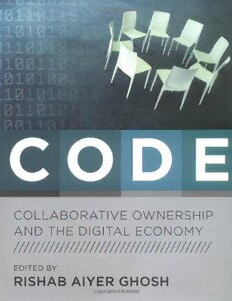Download CODE: Collaborative Ownership and the Digital Economy PDF Free - Full Version
Download CODE: Collaborative Ownership and the Digital Economy by Rishab Aiyer Ghosh in PDF format completely FREE. No registration required, no payment needed. Get instant access to this valuable resource on PDFdrive.to!
About CODE: Collaborative Ownership and the Digital Economy
Open source software is considered by many to be a novelty and the open source movement a revolution. Yet the collaborative creation of knowledge has gone on for as long as humans have been able to communicate. CODE looks at the collaborative model of creativity—with examples ranging from collective ownership in indigenous societies to free software, academic science, and the human genome project—and finds it an alternative to proprietary frameworks for creativity based on strong intellectual property rights. Intellectual property rights, argues Rishab Ghosh in his introduction, were ostensibly developed to increase creativity; but today, policy decisions that treat knowledge and art as if they were physical forms of property actually threaten to decrease creativity, limit public access to creativity, and discourage collaborative creativity. ''Newton should have had to pay a license fee before being allowed even to see how tall the 'shoulders of giants' were, let alone to stand upon them,'' he writes. The contributors to CODE, from such diverse fields as economics, anthropology, law, and software development, examine collaborative creativity from a variety of perspectives, looking at new and old forms of creative collaboration and the mechanisms emerging to study them. Discussing the philosophically resonant issues of ownership, property, and the commons, they ask if the increasing application of the language of property rights to knowledge and creativity constitutes a second enclosure movement—or if the worldwide acclaim for free software signifies a renaissance of the commons. Two concluding chapters offer concrete possibilities for both alternatives, with one proposing the establishment of ''positive intellectual rights'' to information and another issuing a warning against the threats to networked knowledge posed by globalization.
Detailed Information
| Author: | Rishab Aiyer Ghosh |
|---|---|
| Publication Year: | 2005 |
| Pages: | 359 |
| Language: | English |
| File Size: | 1.951 |
| Format: | |
| Price: | FREE |
Safe & Secure Download - No registration required
Why Choose PDFdrive for Your Free CODE: Collaborative Ownership and the Digital Economy Download?
- 100% Free: No hidden fees or subscriptions required for one book every day.
- No Registration: Immediate access is available without creating accounts for one book every day.
- Safe and Secure: Clean downloads without malware or viruses
- Multiple Formats: PDF, MOBI, Mpub,... optimized for all devices
- Educational Resource: Supporting knowledge sharing and learning
Frequently Asked Questions
Is it really free to download CODE: Collaborative Ownership and the Digital Economy PDF?
Yes, on https://PDFdrive.to you can download CODE: Collaborative Ownership and the Digital Economy by Rishab Aiyer Ghosh completely free. We don't require any payment, subscription, or registration to access this PDF file. For 3 books every day.
How can I read CODE: Collaborative Ownership and the Digital Economy on my mobile device?
After downloading CODE: Collaborative Ownership and the Digital Economy PDF, you can open it with any PDF reader app on your phone or tablet. We recommend using Adobe Acrobat Reader, Apple Books, or Google Play Books for the best reading experience.
Is this the full version of CODE: Collaborative Ownership and the Digital Economy?
Yes, this is the complete PDF version of CODE: Collaborative Ownership and the Digital Economy by Rishab Aiyer Ghosh. You will be able to read the entire content as in the printed version without missing any pages.
Is it legal to download CODE: Collaborative Ownership and the Digital Economy PDF for free?
https://PDFdrive.to provides links to free educational resources available online. We do not store any files on our servers. Please be aware of copyright laws in your country before downloading.
The materials shared are intended for research, educational, and personal use in accordance with fair use principles.

